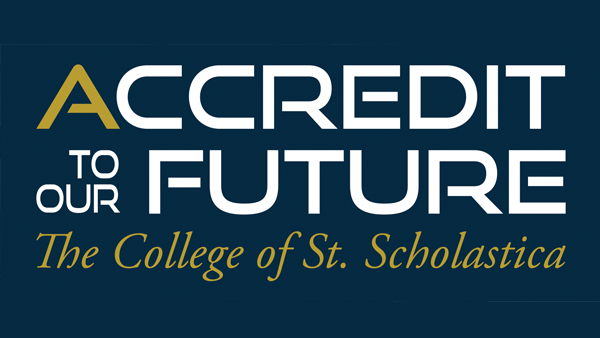December 21, 2022
St. Scholastica undergoes 10-year accreditation reaffirmation
The College of St. Scholastica has been continuously accredited by the Higher Learning Commission (HLC) since 1931. Every ten years, HLC conducts a comprehensive review of St. Scholastica to reaffirm accreditation. In one of the final steps, the College will host a peer review team from the Higher Learning Commission on February 20-21, 2023, to determine the institution’s ongoing ability to meet the criteria for accreditation.
The College is on the HLC Open Pathway, a mature designation with several components over ten years. St. Scholastica has prepared an evidence-based assurance argument that is the basis for reaffirming accreditation in the tenth year of the institutional cycle, which is this academic year.
“The accreditation process is an excellent opportunity to examine what we do from all angles,” said St. Scholastica’s President, Barbara McDonald. “It is also a time to reflect on our history and where we are going as we share our story with the commission.”
What is accreditation?
Accreditation ensures St. Scholastica offers nothing less than the highest academic excellence and rigor, allows the ability for transfer credit acceptance, allows students to qualify for federal financial aid and ensures the College meets the federal requirements set forth by the Department of Education. An accredited degree is required for acceptance into some graduate programs.
Additionally, accreditation is a designation and a process. As a designation, it serves as public recognition that an institution has met accepted standards of quality. As a process, it demonstrates an ongoing commitment to self-study and external peer review. These assessments affirm that quality standards are being met and provide opportunities to enhance student outcomes.
Criteria for accreditation
Institutions are accredited based on the demonstration that they meet the criteria for accreditation and the assumed practices.
- Criterion One: Mission
- Criterion Two: Integrity, Ethical and Responsible Conduct
- Criterion Three: Teaching and Learning — Quality, Resources and Support
- Criterion Four: Teaching and Learning — Evaluation and Improvement
- Criterion Five: Resources, Planning and Institutional Effectiveness
- Federal Compliance
“As an institution, we are committed to continually improving. We believe that our Catholic Benedictine mission is important and meaningful as we seek to send forth students grounded in academic excellence and moral preparation,” she said. “We look forward to the review committee’s recommendations as we close this chapter of the process and look ahead to the next ten years.”


